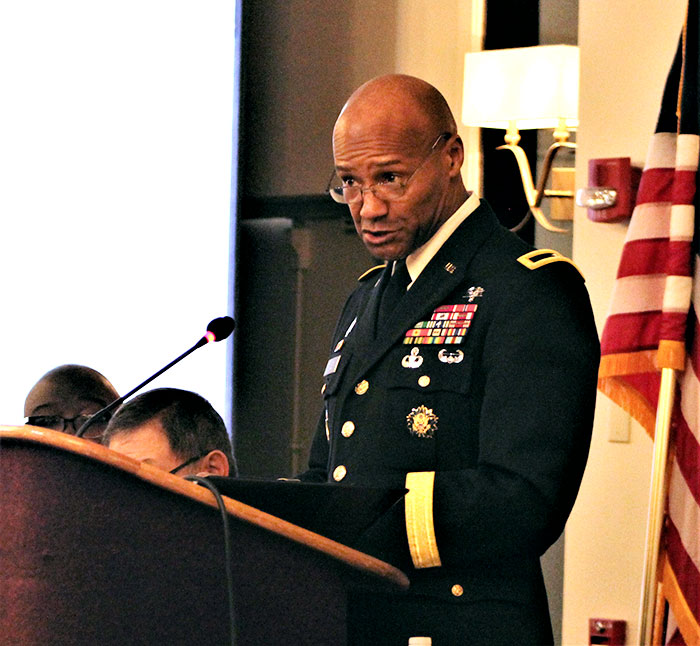Talley Talks Partnerships, Pathway to Progress at SMART PROC

Celebrating the one hundred day mark of his tenure as the commander of the U.S. Army Medical Research and Development Command and Fort Detrick, Brig. Gen. Michael Talley delivered a clear, concise message during his keynote speech at the 17th annual "Strengthening the Mid-Atlantic Region for Tomorrow Procurement Conference (SMART PROC)" on November 19 in Frederick, Maryland.
"We are in the business of saving lives at USAMRDC," said Talley to the more than one hundred small business owners, employees, and industry partners in attendance. "And we're always looking for the right people to help us do that."
Talley's opening words provided a backdrop for the rest of his speech, which was designed to explain the mission and vision of the USAMRDC and, further, how attendees can work with the federal government to achieve those mutually-desired ends. In addition, his commentary provided a general theme of sorts for the final day of the two-day event, which is noted for its ability to create unique partnerships and contracting pathways for the benefit and support of the USAMRDC and the larger DOD.
"Over the years, this conference has been a continuing fusion of science and technology at the federal, state, and local levels," said Phil Jaurigue, chairman of SMART, who – in a nod to the potential impact of the conference – further noted that federal contracting accounts for ten percent of the entire gross domestic product of the state of Maryland.
For his part, Talley focused the majority of his speech on current Army and command priorities; notably the need for modernization and increased Soldier lethality – areas ripe for the introduction of new and emerging viewpoints and technologies. Specifically, Talley highlighted continued medical innovation as an integral force in maintaining dominance on the future battlefield, and further paired this capability gap with his own personal desire to streamline the process by which products evolve from mere ideas into actual tools for Warfighter usage.
"It takes too doggone long to get these products into the hands of the Warfighter," said Talley. "And so we're trying to remedy that."
Those potential remedies lay in the pathway interested businesses take en route to ultimate partnership with the federal government; one that starts with the DOD Office of Small Business Programs (OSBP). In addition to advocacy work, the OSBP works collaboratively with Contracting Officers, Commanders, Program Managers, and the Small Business Administration during the early stages of acquisition planning to determine the extent of small business utilization.
"The OSBP is responsible for empowering small businesses with useful and transparent information that encourages increased participation in the procurement process which directly supports current and future capabilities within the U.S. Army," said Jerome Maultsby, OSBP Assistant Director for the U.S. Army Medical Research and Development Command.
The two-day event further featured representatives from the offices of Maryland state senator Michael Hough and U.S. Senators Ben Cardin and Chris Van Hollen, all of whom urged continued cooperation on behalf of both the federal government and private industry to strengthen the economic base of the state of Maryland and the entire mid-Atlantic region.
To that end, a slew of entities within the larger USAMRDC structure held sessions dedicated to topics ranging from the specifics of technology transfer opportunities to proposal writing to understanding the intricate nature of any number of federal support services. USAMRDC subcommands participating in the event included the U.S. Army Medical Materiel Development Activity (USAMMDA), the Congressionally Directed Medical Research Programs (CDMRP), and the Telemedicine and Advanced Technology Research Center (TATRC), among others.
Talley closed his remarks by advertising the number of ways by which contracting companies and industry partners of all stripes can partner with the USAMRDC, a point expressed by other USAMRDC personnel during later sessions as well.
Said Talley, "We're going to need the whole government approach, and we're going to need to the small business approach to achieve our goals."
 An official website of the United States government
An official website of the United States government
 ) or https:// means you've safely connected to the .mil website. Share sensitive information only on official, secure websites.
) or https:// means you've safely connected to the .mil website. Share sensitive information only on official, secure websites.


